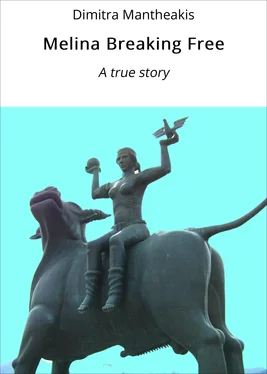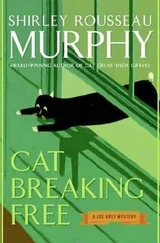They never opened up their house on a feast day nor did a visitor ever cross their threshold. They didn’t have the money to buy the essentials for those occasions. And Melina was envious then, during festive days, to see the illuminated houses of others with people coming and going, music pouring out of open windows, and her smelling the tantalizing aromas of food that made her stomach gurgle in protest at her deprivation. Melina, out of pride, never accepted invitations, knowing that she could not reciprocate. She cried to herself from time to time and on other occasions became furious at her family’s wretchedness, hurling anathema at their poverty and realizing that her grandmother’s constant solace “let us be happy that we have our health!” sounded empty to her ears, and was anything but consoling.
“Is there an illness worse than poverty?” wondered the young girl. “Is there worse torture that an empty stomach, the overcoat you don’t own, frozen hands and feet when the winter brazier dies out because there is no more coal? Money is the cure, the only cure! Without it you are nothing and others see you as nothing!”
Many similar thoughts found a nest in Melina’s mind, as if she was a grown-up woman, and they verged on becoming an obsession. The worry and humiliation with which she watched her family suffering like Christ on the Cross, but without hope for the future, was killing her. She preferred not to have been born because she could not put up with this daily anguish from as far back as she could remember. She couldn’t bear seeing her underweight siblings getting up from meals with their stomachs still half empty, and young Melina pursed her lips, promising herself she would put her life in order one day at any cost.
Mary entered her house and threw her satchel onto a chair. Her mother was spreading the green baize material over the table in the living room. “Are they going to play cards again?” wondered the girl. She was fed up twice a week hearing the knocking of knuckles on the card table and smelling stifling cigarette smoke coming through cracks in her bedroom door. Her mother Penelope, like so many of her compatriots, had acquired a card-playing habit. Wherever they looked for her, one could be sure of finding her at one or another poker or rummy table. She had long ago got over the stage of playing an innocent game of biriba and had entered very deep waters. Penelope could hardly wait for her daily family obligations to be over with, to be free to play cards either at home or at a house of a friend with the same passion.
She was a good-looking woman who took particular care of her appearance and took full advantage of the dollars sent without fail every month by her sister from overseas. Penelope felt no remorse at parting with some of this at the green felt covered table since her sister was unmarried and the money that she made from her business was more than enough for her. Penelope wasn’t doing anyone any harm by wanting to enjoy herself a little. Provincial life was so boring and the days were so much one like the other without her beloved pastime!
Menelaos, her doting husband, had a permanent weak spot for her. He went to great lengths to justify this need of hers since Penelope didn’t have the opportunity to let off steam by enjoying herself at nightclubs as she had in Athens from where he had brought her to this isolated province when he had opened his pharmacy. The whole family put up with their mother’s vice because she had been given the go-ahead by the father, the head of the family, despite the secret disapproval of the children who knew the futility of expressing any objection. Neither of their parents would take any notice.
Iakovos rang the doorbell of his house for a long time after managing to get away from his schoolmates. He had forgotten his keys and he wondered what they were doing by not opening the door for him. “Have my mother and sister gone deaf?” he asked himself. He waited for a quarter of an hour, in vain. He then decided to go to his father’s newsagents shop two blocks away to see if his mother had gone by there. When he arrived he found the shop closed and the shops next door were also closed for siesta time. “Maybe they’re coming home via another street,” he thought, and started off again for his house. When he arrived he rang the bell, but again there was no reply. The young boy was worried now. “Could something have happened to them?” he wondered, concerned. He waited for another ten minutes and then went next door and rang Mrs. Katina’s doorbell. The woman appeared dressed in a bathrobe with curlers in her hair. “Have you seen my mother, Mrs. Katina? I’ve been ringing for a long time and they aren’t replying and the shop too is closed.”
“Come in, my boy!” the woman said. She made him sit in the kitchen and said, “They took your father away this morning. They are taking him to Athens with Aristides, the barber, and Melpo, the teacher.
“Who took him, Mrs. Katina?” he asked with an expression of worry.
“Well, I don’t know. The police…with these damned politics!” Katina replied.
“But he only came back six months ago. Why did they arrest him again?”
“My boy, I haven’t a clue. They said he refused to sign some papers and he will be sent with the others to one of the barren islands for exiles. How stubborn he is, that father of yours! He could have signed and saved you all and himself from all this bother!” Katina commented.
Iakobos went silent. What could the poor boy say! It hadn’t been the first time his father had been jailed for his political convictions. It was twice as difficult for him now because after his father was freed from jail the last time the boy had thought that their worries were finally over and that no one would bother them again, no one would bang on their door in the middle of the night, nobody would drag his father like a sack of potatoes to lead him to God-knows-what prison, God knows–to-what isolated location. The boy felt indignation welling up inside him. His anger wasn’t directed at that moment against the police; he blamed his father for his obdurateness and his adherence to inexplicable, for the boy ideologies that had been the cause of so much anguish and so many worries for them. What business of his was it to get involved in these to-dos, regularly abandoning his work and family? Wasn’t their poverty enough? Had they the luxury of getting involved in situations that only promised them trouble and no benefits? His anger brought tears to his eyes. Then he thought about his mother and sister and the fear they must have felt. He wiped his wet cheeks and nose with the back of his hand and asked Mrs. Katina if she knew where the women were.
“The were at the police station from this morning in the hope of persuading the chief officer to let him go, but as Sotiris, the taxi driver, the father of your classmate Dina, told me, they didn’t achieve anything. He saw the three of them being put into the back of an army lorry with some others from nearby villages and they left for who knows where. I believe that your mother and sister will be home soon,” Mrs. Katina said, stroking his head to console him.
Iakovos didn’t want anyone to touch him at that moment. Even his natural cheerful and playful character didn’t allow him to recover and to get over the latest hurdle by arming him with patience and endurance. The story of his father had gone on too long. The family had no business paying for his mistakes and to be left in limbo for months whenever they took him away. But whatever Iakovos thought, as angry as he got, he knew that he was helpless to do anything. These situations could not be fixed from one moment to another.
Ten minutes later from the window he saw his mother and sister with an expression of disappointment on their faces. He rushed outside and ran towards them. Kiki, his mother, hugged him silently and Tassia, his sister, looked at him sadly with her eyes red from crying. Iakobos knew what would follow, and for who knows for how long. His mother would break her back carrying crates of water and soft drinks and organizing a myriad of items, wearing out her legs to serve customers for endless hours to keep them happy so that they wouldn’t go to shop elsewhere else. Tassia would start working overtime at night at the dressmakers where she worked to earn a little more to help add to their meager income. 12 year-old Iakovos was determined to help out, as much as he could, after school at their little shop in order for his mother not to collapse from overwork. As a last resort he could do his homework behind the counter to allow Kiki to pop over to their house to prepare a meal and do her housework while Iakobos looked after the newsagents shop in the afternoon.
Читать дальше












